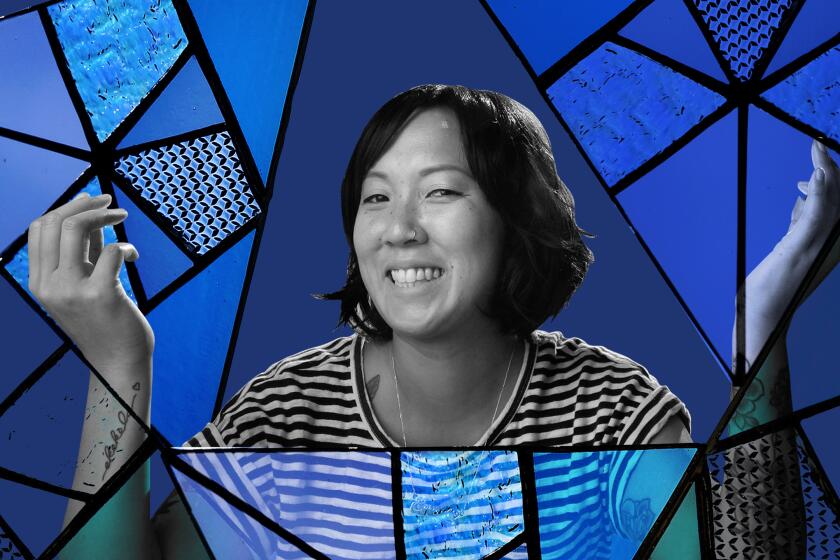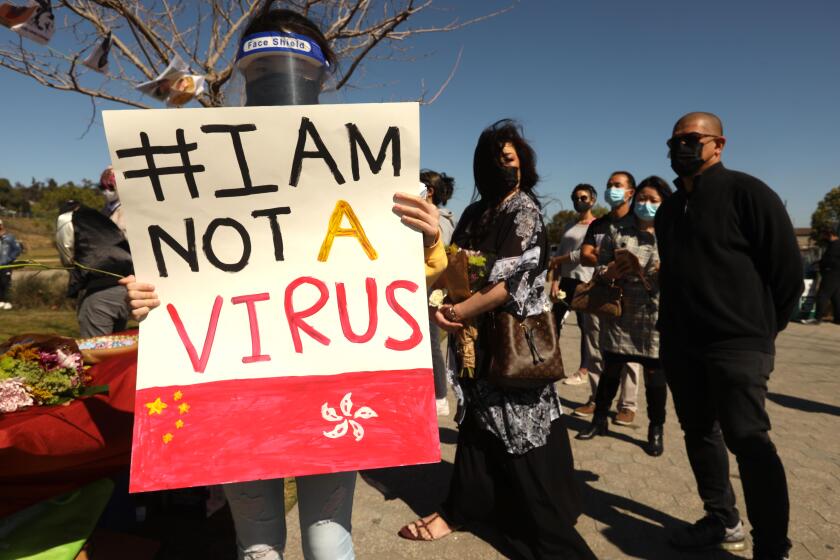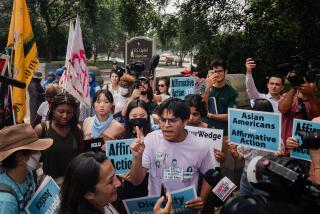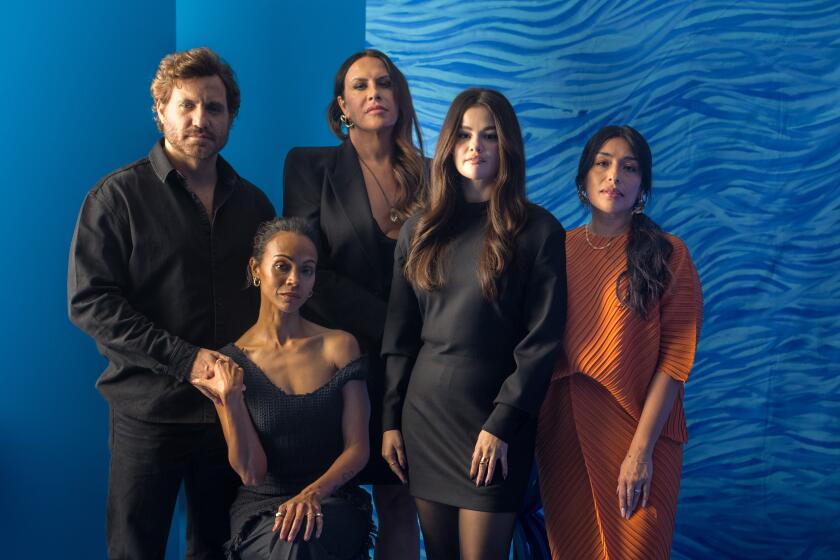At first, Kyoko Takenaka felt guilty about secretly recording men who approached in bars.
While grabbing drinks in Washington, D.C., and New York City over the course of about seven years, the roaming filmmaker, actor, model, musician and performance artist used any audio-recording device they had on them, usually a phone, to document the myriad racist comments strangers forced upon them in private conversation.
“Is this even OK for me to do?” Takenaka wondered at the time, knowing the men’s slurred, insensitive tangents would later be exposed in some way through their art. (“Your face is very beautiful and it’s very Oriental,” “I take you for sushi, if you like sushi?,” “Koreans have very puffy cheeks,” various men say in the soundbites.)
“But as I started recording, I realized how, throughout my entire life, all of these experiences are nonconsensual, and Asian Americans are holding on to all of these nonconsensual experiences and microaggressions that don’t belong to us at all,” Takenaka says on a recent video call from Tokyo.
“I felt very empowered to make productive use of that nonconsensual way of speaking and way of fetishizing our culture, fetishizing me as a human, dehumanizing us. And recording was the only way for me to be able to translate this exact experience, because so often Asian Americans are gaslit about their experience.”
Audio from the unsolicited exchanges can be heard in Takenaka’s film “Home,” released publicly last month. The short is a four-chapter compilation of cinematic and sonic set pieces, original poetry and music that reflect on Takenaka’s identity and experiences as an Asian American femme.
“I want viewers to understand all the ways that they’re complicit or actively involved in the fetishization and othering of Asian American experiences,” says Takenaka, who is primarily based in Los Angeles.
“What’s so triggering and frustrating is that it’s those same people who are now posting #StopAsianHate who teased me relentlessly as a child in the school playground, who gentrify our neighborhoods and erase our community in Little Tokyo and Chinatown. And I need people to see that connection, that they are complicit.”
Coming of age in Newton, Mass., Takenaka’s childhood home was known by the rest of the neighborhood as “the house.” It was the house where a working class, Japanese American family lived in a predominantly white suburb lined with white picket fences.
In elementary school, Takenaka remembers “wanting to fit in so badly” as classmates ridiculed their homemade lunches, which they would eat in the bathroom or throw away to avoid harassment because they were “so sick and tired of crying.”
Those painful memories of othering and racism, as well as domestic violence, made Newton a site of immense trauma for Takenaka. So when they heard, about 10 years ago, that “the house” was set to be demolished, they knew they had to film it — though they didn’t know, yet, for what purpose.
“I honestly thought it would turn into, like, a punk music video one day or something,” says Takenaka, who also sings and plays guitar for a London-based, queer Afro-Asia band called Wastewomxn. “And then when I wanted to create this film, I knew that that was something that was such a big part of my home and upbringing. ... Film is such a powerful tool to be able to communicate a past moment in time and be able to bring that into the present.”
Juxtaposed with photos from Takenaka’s youth, “Home” opens with black-and-white footage of its director taking a hammer to the walls of the abandoned dwelling and sifting through their family’s old belongings to the tune of a haunting cover of the American classic “Take Me Home, Country Roads.”
“I knew that I wanted to have this cathartic experience of going through all my things while it’s still there ... banging on the walls and getting out all of my childhood trauma in a physicalized form of the house,” Takenaka says.
Partly because its inspirations and contents are so deeply personal, Takenaka was initially hesitant to release “Home” beyond local screenings and film festivals. It wasn’t until after six women of Asian descent were killed in Atlanta-area shootings and the movement to #StopAsianHate gained intersectional momentum that Takenaka decided to upload it to their website and social media.
“I felt compelled to share it during this really triggering time for so many Asian American femmes,” Takenaka says. “This is nothing new for Asian Americans. This is something that we’ve dealt with since the beginning of our migration, since the 1800s.
“Right now, people are receptive, finally, to hearing our stories. And so it can be really overwhelming for Asian Americans to then have to explain all of their traumas personally. ... If [‘Home’] could be of use to Asian Americans to not have to do that labor ... I wanted it to be of use.”
Artist Janel Foo wanted to do something to help amplify AAPI voices in L.A. More than 60 artists responded.
More than 312,000 people on Instagram alone have now heard the barrage of racist and misogynistic barroom remarks Takenaka captured on tape for “Home.” In reaction shots — which were filmed later in similar locations and added in postproduction — an unimpressed Takenaka calmly sips different drinks and stares down the camera.
“I wanted people to experience it live as an Asian American person does,” Takenaka says. “And also, in re-creating those visual shots, it was kind of like a reclamation for how I wanted to respond in that moment when I was dealing with the trauma but maybe ... wasn’t quite able to.
“I think that’s an experience that so many Asian Americans can really relate to where, after something traumatic happens ... they blame a lot of responsibility on themselves saying, ‘Oh, I should have said this’ ... and ‘Why didn’t I speak up more?’ ... But there’s so much power in being able to hold that moment and seeing just how absurd it is.”
Since posting clips from “Home” on Instagram, Takenaka has been overwhelmed and empowered by the influx of direct messages from Asian American women and femmes for whom the short has been a source of healing and validation.
Among the first to see “Home” before its 2017 debut at a multimedia art show in Los Angeles was Takenaka’s longtime collaborator, Jenevieve Ting, who has witnessed screening attendees burst into tears and “wake up” upon viewing the soul-searching piece for the first time.
“It’s really generous of Kyoko to offer ‘Home’ to the public right now,” says Ting, a writer and artist based in L.A. “What Kyoko did ... was like giving us permission ... as Asian Americans to be like, ‘No, you are allowed to feel the rage and the grief and the pain that you have felt for so long, that you’ve been screaming silently to yourself.’
“Finally someone told me, ‘Yes. Scream, yell. This hurt and this rage is yours too.’ And if it helps to open people’s understanding of how deep the pain goes for AAPI women — for people who were socialized as women, for femmes, for nonbinary people, for trans folks — I hope that it gives so many of us further permission to access, not only the pain, but the rage. And also the hope and the possibility for futures that are more honest and fair to all of us.”
About 68% of the anti-Asian attacks documented during the pandemic were verbal harassment, 21% were shunning and 11% were physical assaults.
Another of Takenaka’s collaborators, kyoko nakamaru, called the instinct to tape the “one-directional” exchanges “brilliant.” The spiritual counselor and writer from L.A. first saw “Home” in 2018 at a community pop-up space in Little Tokyo, where she connected with the experience of “perpetual othering that Kyoko illuminates in their film.”
“[The] racist tropes you hear in those clips are things that we hear from non-Asian folks on the daily,” nakamaru wrote in an email. “[It’s] relentless, it’s exhausting, and Kyoko called it out without saying a word. Their refusal to give either expression or verbal response was an antidote for me and all the times I engaged those conversations.”
Though many are just discovering it now, it’s been a few years since Takenaka completed “Home,” and they’ve since moved on to the next chapter. Currently, they are in Tokyo working on a follow-up to the film, which they also plan to adapt into a TV series as they dive deeper into narrative filmmaking.
Thus far, Takenaka’s progress on the sequel has been mostly observational — accessing their Japanese heritage and absorbing the culture in its purest form while tourists aren’t permitted to enter because of the ongoing public health crisis.
In a segment of the project called “Kung Flu Virus: Come Fly Me Away,” Takenaka delves into the internal reflections and external anti-Asian sentiment that informed their decision to temporarily relocate to Japan in November, when hate crimes against Asian Americans were on the rise and the tired, racist refrain, “Go back to your country” reverberated throughout the United States.
“You know what? Fine,” Takenaka recalls thinking at the time. “Maybe we will.”
Earlier this year, Takenaka presented “Kung Flu Virus: Come Fly Me Away” via the Music Center in L.A. They dedicated the preview to the late Vicha Ratanapakdee and “all of our Asian-American elders” who have been under constant threat and attack during the pandemic.
“I’m learning that my goal as an artist is to provide healing for Asian Americans,” Takenaka says. “I don’t think it’s something that any of us chose to do. And it’s not something that we had autonomy over.
“All of this trauma did not belong to us. And yet I can’t help but create work around Asian American identity. ... Whether that’s through acting or directing, music, performance art ... I hope to incorporate all those things to uplift our community.”
Ovation Award organizers mistake nominee Jully Lee for a different Asian actor. In protest, the city’s largest theaters pull out of the L.A. Stage Alliance.
More to Read
Only good movies
Get the Indie Focus newsletter, Mark Olsen's weekly guide to the world of cinema.
You may occasionally receive promotional content from the Los Angeles Times.













